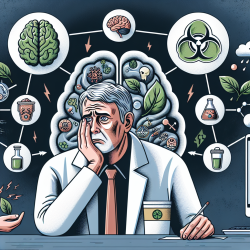In today's fast-paced world, where medical and dental students often find themselves overwhelmed with academic pressures, incorporating nature into their education can be a game-changer. The research article "Nature as Medicine and Classroom: Evaluating an Innovative, Outdoor Course for Medical and Dental Students" explores the benefits of an outdoor course designed to integrate nature-based health techniques into medical training.
The Benefits of Nature-Based Learning
The study highlights the transformative power of nature in enhancing students' well-being. Participants reported feeling less stressed and more mindful after engaging in activities such as forest bathing, mindful walking, and expressive art workshops. These experiences not only improved their mental health but also equipped them with skills applicable to their future medical practices.
Key Outcomes of the Outdoor Course
- Enhanced Cognitive Functioning: Students experienced increased attentional capacity and improved focus.
- Mindfulness: Nature immersion helped students stay present and appreciate the moment.
- Connection to Nature: Participants developed a deeper appreciation for the natural world and its healing properties.
- Overall Well-Being: Many students reported feeling rejuvenated and more at peace.
Implementing Nature-Based Practices in Medical Training
For practitioners looking to integrate these findings into their own practice or educational programs, consider the following steps:
- Create Outdoor Learning Opportunities: Develop courses or workshops that take place in natural settings to provide experiential learning opportunities.
- Incorporate Mindfulness Practices: Encourage activities like mindful walking or meditation that help students connect with their surroundings.
- Promote Expressive Arts: Use creative outlets such as painting or music to help students process their experiences and emotions.
- Foster a Connection with Nature: Educate students on the health benefits of spending time outdoors and encourage regular nature exposure.
The Role of Practitioners in Promoting Well-Being
The role of practitioners extends beyond clinical care; they have the potential to influence the next generation of health professionals by incorporating holistic approaches into their training. By embracing nature-based practices, educators can help reduce burnout among students and foster a culture of resilience and well-being in the medical field.
A Call for Further Research
The positive outcomes from this study suggest that further research is needed to explore the long-term impacts of nature-based education on medical professionals. Understanding how these practices can be integrated into everyday clinical work will be crucial in promoting sustainable health care practices.
If you're interested in exploring this topic further, consider reading the original research paper. It provides detailed insights into how nature can serve as both medicine and classroom for future health professionals. To read the original research paper, please follow this link: Nature as Medicine and Classroom: Evaluating an Innovative, Outdoor Course for Medical and Dental Students.
By embracing nature's healing power, we can create a more holistic approach to medical education that benefits both practitioners and patients alike.










